Hunting tinctures are effective mixtures designed to attract game using natural ingredients, like deer meat. To create your own, you'll combine fresh deer meat with sodium benzoate and glycerine, enhancing the scent with essential oils. Cooking and macerating the mixture allows flavors to meld, making it more potent. Experimenting with different scents can improve your hunting success. Discovering new tincture techniques can elevate your strategy and make each hunt more rewarding. There's more to explore about perfecting your tincture!
History

Tincturing has deep historical roots, as cultures around the world have long used this method to preserve and enhance scents from natural materials.
Early hunters crafted tinctures from local fauna and flora, utilizing animal glands and aromatic plants to mimic the scents found in nature. This practice not only attracted game but also showcased the hunters' knowledge of their environment.
Early hunters skillfully crafted tinctures from local plants and animal glands, enhancing their connection to nature while attracting game.
As time went on, tincturing evolved, and the science behind it advanced. You might be familiar with Tonquin Musk, a synthetic alternative that replicates traditional scents.
Today, modern hunting tinctures focus on effectiveness and environmental compliance, ensuring they meet regulations while attracting a variety of game.
This rich history continues to influence the way you connect with nature through hunting.
Recipe
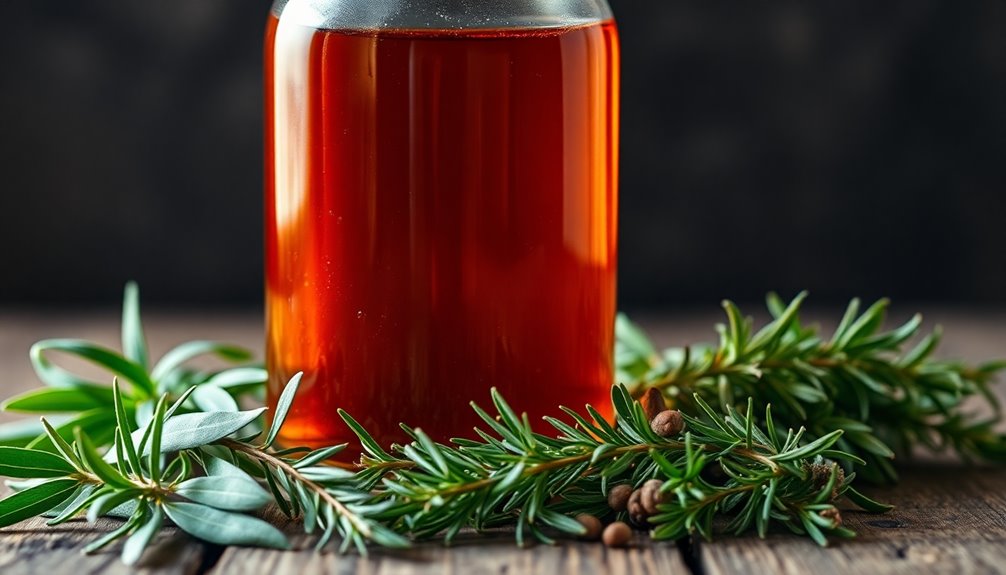
Creating a hunting tincture is an excellent way to enhance your chances during hunting season by attracting game with a rich, appealing scent. This recipe utilizes deer meat, which is known for its potent aroma, making it a great base for your tincture. By extracting the essence from the meat and combining it with sodium benzoate and glycerine, you can create an effective lure that's both easy to make and potent in the field.
To start, you'll need to gather your ingredients and equipment. The process involves cooking the deer meat to release its natural scent, followed by mixing it with the preservative and glycerine. This tincture can be made in small batches to test its effectiveness before you decide to make larger quantities. Remember, the quality of your ingredients, particularly the meat, will significantly influence the final scent of your tincture.
Ingredients:
- 1 chunk of deer meat (fresh, canned, or roadkill)
- 1 cup of water
- 1 cup of glycerine
- 1 teaspoon of sodium benzoate
Cooking Instructions:
Begin by placing the chunk of deer meat into a pressure cooker with one cup of water. Seal the lid and cook on high pressure for 20 minutes.
After the cooking time is complete, release the pressure and allow the meat to cool slightly. Once cooled, strain the liquid from the meat, discarding the solids. In a clean container, mix the strained liquid with one cup of glycerine and one teaspoon of sodium benzoate. Stir well until the sodium benzoate is fully dissolved, creating your hunting tincture.
Extra Tips:
When making your hunting tincture, consider experimenting with different types of meat to see which one produces the most appealing scent for your specific hunting needs.
Freshness is key—using fresh meat will generally yield a stronger aroma compared to older or canned options. Additionally, try varying the cooking time and method to find the perfect combination that works best for you.
Store your tincture in a cool, dark place to preserve its scent and effectiveness.
Cooking Steps
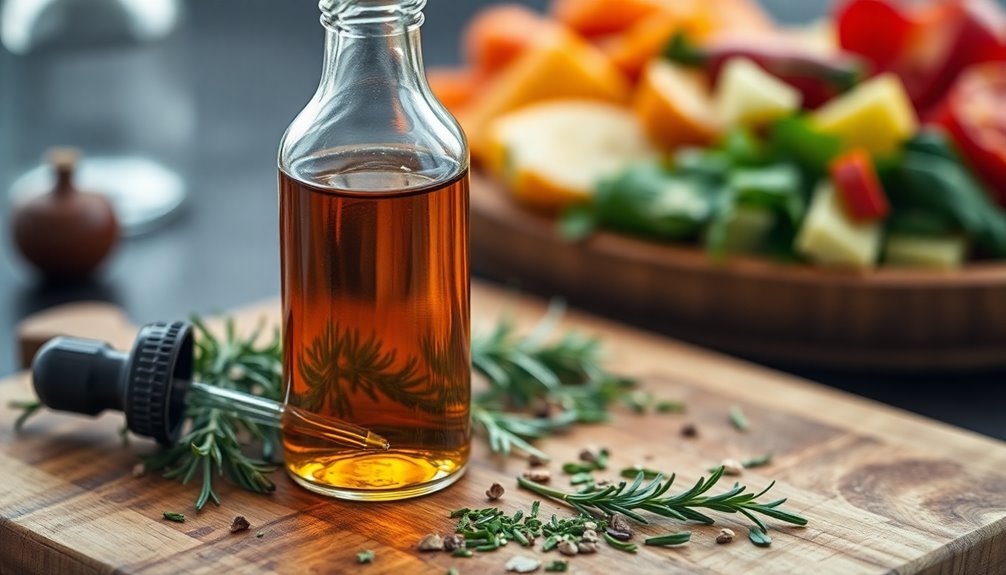
To create an effective hunting tincture, you'll want to gather all your ingredients first.
Start by mixing essential oils and adding skunk tincture to enhance the aroma.
After that, incorporate natural attractants and blend in animal fats to round out your concoction.
Step 1. Gather Hunting Ingredients First

Gathering the right ingredients is essential for crafting a successful hunting tincture. Start by dissolving sodium benzoate in water to create a preservative solution; this helps maintain your tincture's integrity.
Mix this solution with glycerine in a 50/50 ratio, as the glycerine acts as a binder and extracts scents effectively.
Next, use a pressure cooker to cook a chunk of fresh deer meat for about 20 minutes. This process releases flavorful and aromatic compounds into your broth.
Remember, using fresh or properly preserved meat is key; cooked meat typically yields a more attractive aroma than raw.
Don't hesitate to experiment with different meat types and proportions, starting with small batches to refine your recipe.
Step 2. Mix With Essential Oils
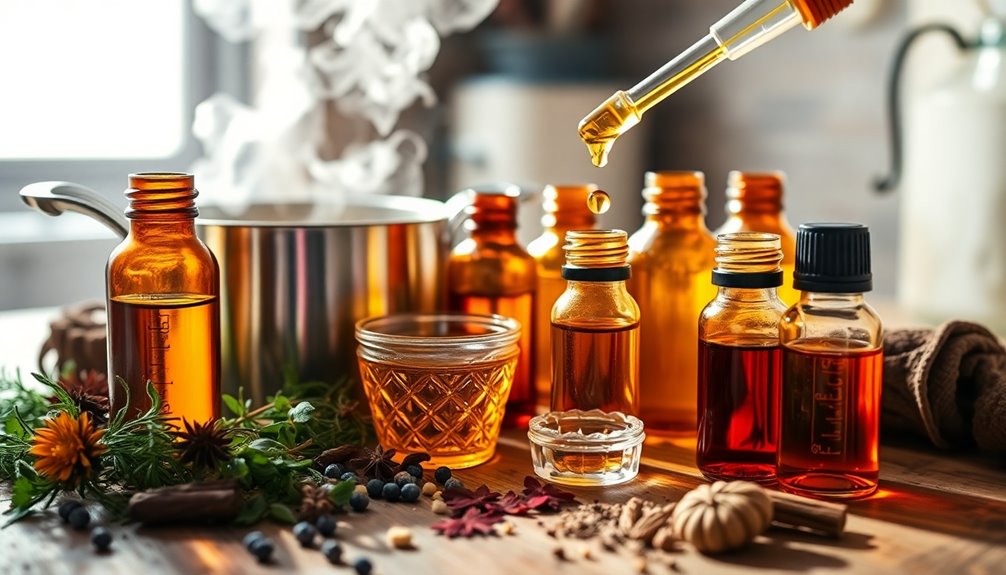
Once the broth has cooled, you can enhance its scent profile by blending in essential oils like acorn or apple oil. Measure out your chosen essential oil, and start with just a few drops. Stir it into the broth, tasting as you go to ensure the aroma remains appealing. This step is crucial for creating an enticing scent that attracts game.
Once mixed, let the tincture macerate for up to a month. This allows the flavors to meld and the scents to intensify.
After the maceration period, filter the tincture to remove any solid particles. Finally, store the finished product in a glass bottle, ensuring it's protected from light to maintain its potency.
Step 3. Add Skunk Tincture Next
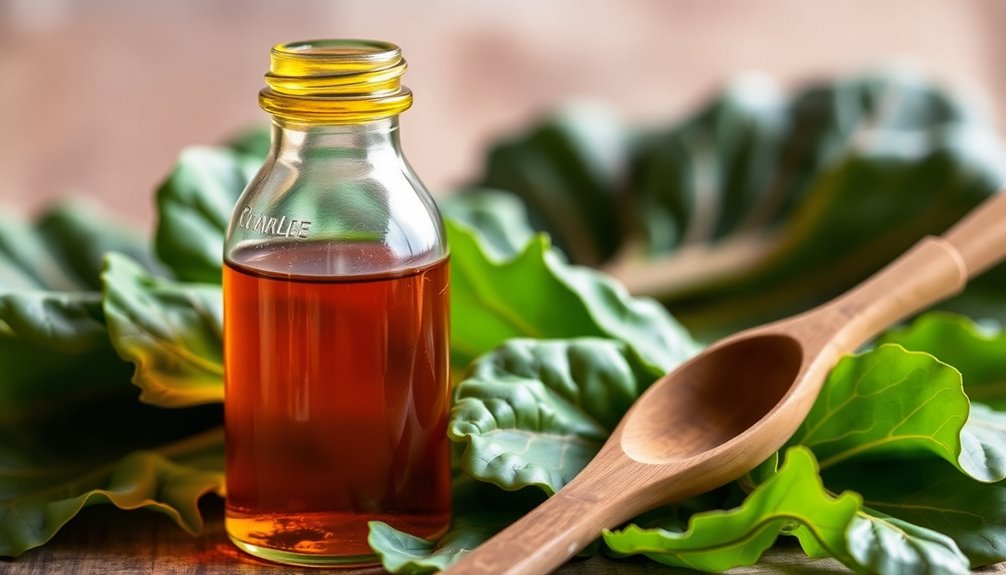
After letting the broth macerate, it's time to infuse it with skunk tincture, which can significantly enhance your hunting success.
This unique scent replicates the intriguing aroma of a skunk, effectively attracting both predators and big game species. You can choose between the 1-ounce S-1 Skunk Tincture for $4.50 or the larger 4-ounce S-2 version for $18.
To maximize its effectiveness, apply the tincture strategically in areas where game is likely to pass. The skunk scent piques animals' curiosity, drawing them closer to your hunting spot.
Plus, you can mix it with other scents for an even more potent attractant. Remember, skunk tincture is versatile and suitable for various game types, so make the most of it!
Step 4. Incorporate Natural Attractants
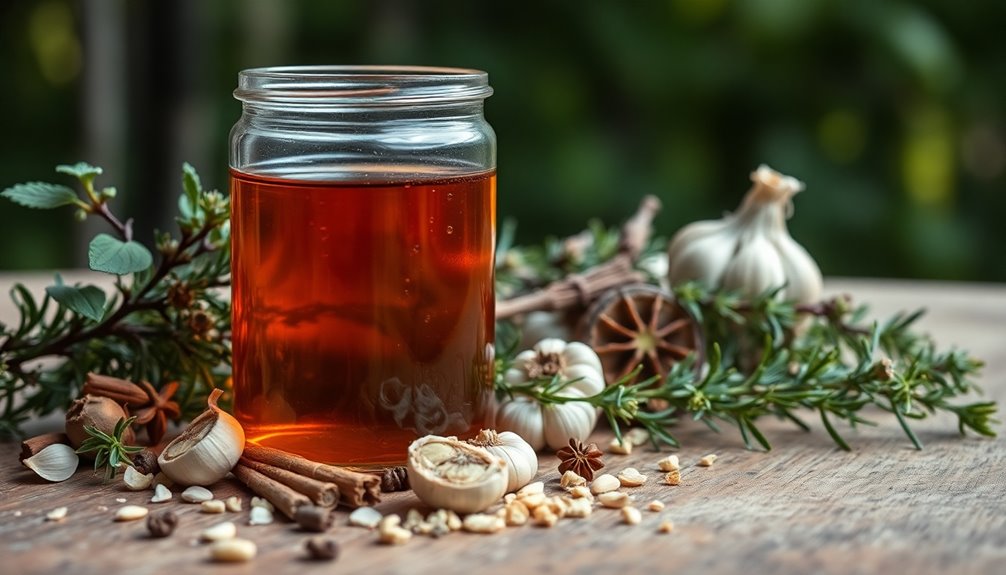
Enhancing your hunting strategy can also involve incorporating natural attractants into your tincture.
Start by dissolving sodium benzoate in water to prevent spoilage. Next, mix a 50/50 solution of this sodium benzoate mixture with glycerine, which acts as a binder and preservative for the scent.
If you're aiming for a meat-based tincture, pressure cook a chunk of deer meat for 20 minutes to extract the aromatic broth. Once cooled, combine this broth with your glycerine mixture to enhance the scent profile.
Don't hesitate to experiment with different types of meat and additional scents to improve the overall appeal and attraction of your tincture for various game animals. This experimentation can lead to more successful hunting trips.
Step 5. Blend in Animal Fats
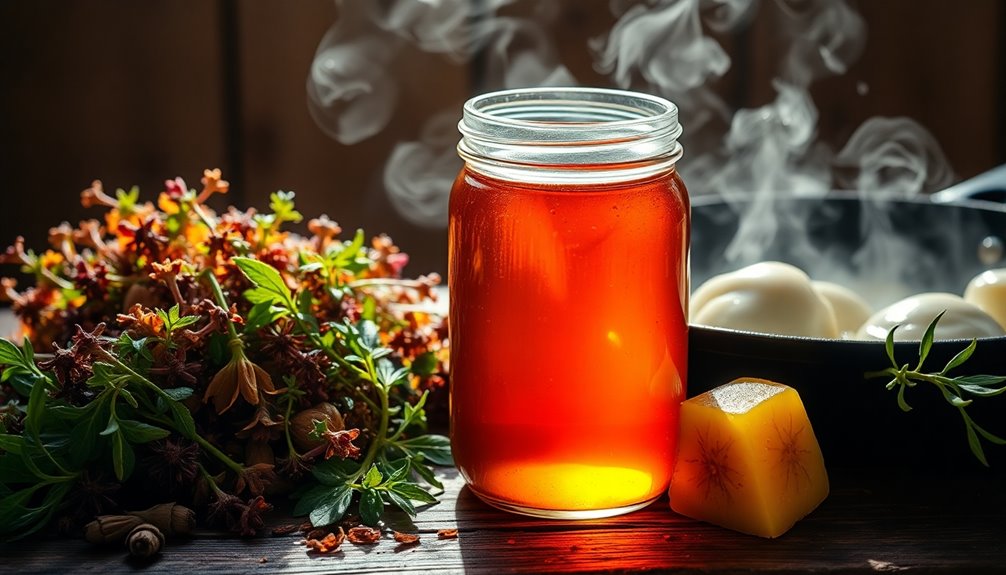
Rendering animal fats is a crucial step in crafting an effective hunting tincture. Start by slowly heating the fat from your chosen animal, like deer, until it liquefies.
Once it's rendered, let it cool slightly before mixing it with your tincture base, aiming for a balanced fat-to-liquid ratio for optimal scent release.
To improve consistency and scent retention, incorporate a binding agent such as glycerine to emulsify the mixture.
After blending, store it in a dark, cool place for a few weeks, allowing the flavors and aromas to meld.
Don't forget to shake the container regularly to keep the fat and tincture components well combined, maximizing scent potency when you apply it during your hunting excursions.
Final Thoughts
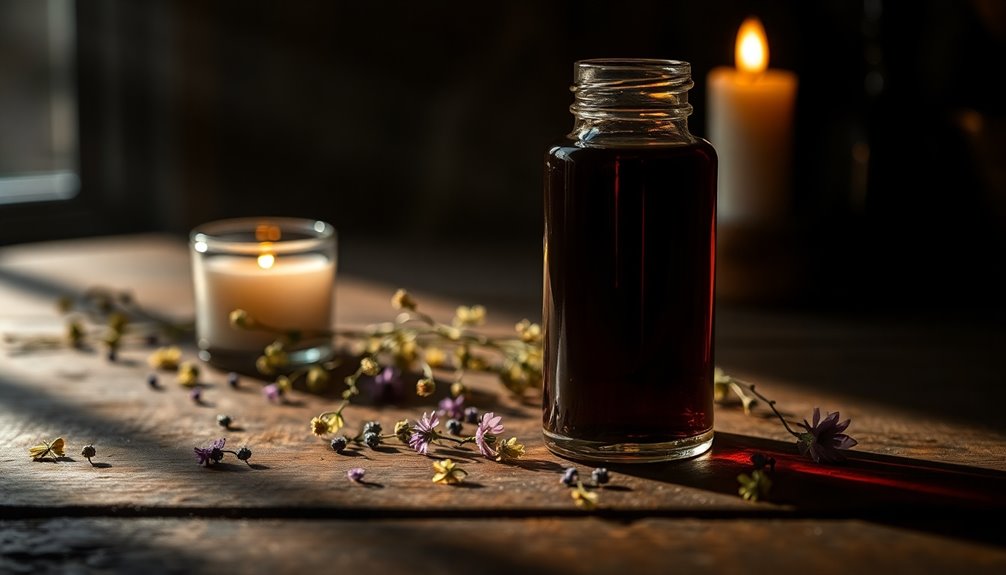
While experimenting with tincturing meat can seem daunting, it offers a unique opportunity to enhance your hunting experience. By utilizing ingredients like sodium benzoate and glycerine, you can create potent lures that attract game effectively.
The process of pressure cooking meat allows you to extract rich scents, which can significantly improve your bait formulations. Don't shy away from trying different meat types, even roadkill; you might discover unique aromas that draw in specific wildlife.
Start with small batch trials to evaluate your tinctures before scaling up. Remember, understanding the differences between fresh and cooked meat scents can dramatically impact your tincture's effectiveness.
Begin with small batch experiments to fine-tune your tinctures, as the scent differences between fresh and cooked meat can greatly enhance their potency.
Embrace this creative approach, and you might just elevate your hunting success. Happy tincturing!
Frequently Asked Questions
What Ingredients Can I Use for Hunting Tincture?
When you're looking to create a potent tincture, start with high-quality herbs like valerian root or catnip for their calming properties.
You'll need a high-proof alcohol like vodka or everclear to extract the beneficial compounds.
Consider adding dried fruits or citrus peels for flavor and additional benefits.
Ensure you've got a glass jar for steeping your mixture and let it sit for a few weeks, shaking it occasionally to enhance the infusion.
How Long Does Hunting Tincture Last?
So, you've concocted a magical potion and now you're wondering how long it'll last?
Well, it's not like it's a fine wine that gets better with age! Typically, your tincture will last about one to two years if stored in a cool, dark place.
Just keep it away from sunlight and heat—no one wants to be sipping on a science experiment gone wrong!
Can I Use Hunting Tincture for Medicinal Purposes?
You can use certain tinctures for medicinal purposes, but it's essential to know their specific properties and effects.
Always check the ingredients and consult with a healthcare professional before using any tincture for health reasons. Not all tinctures are safe for medicinal use, and some may have side effects or interactions with medications.
It's better to err on the side of caution and ensure you're making informed decisions about your health.
Is Hunting Tincture Safe for Pets?
You might worry that something labeled for human use could be harmful to pets, but safety varies by product.
If you're considering using hunting tincture around your furry friends, it's essential to consult your veterinarian first.
Pets can react differently to certain substances, and what's safe for you mightn't be safe for them.
Always prioritize their health and well-being by seeking professional advice before introducing any new products into their environment.
Where Can I Buy Pre-Made Hunting Tincture?
You can find pre-made tinctures at various online retailers, health stores, or specialty shops that focus on herbal products.
Websites like Amazon or local herbalist shops often carry a selection. If you're looking for something specific, check user reviews and product descriptions to ensure you're getting a quality product.
It's always a good idea to compare prices and ingredients before making a purchase to find the best option for your needs.









